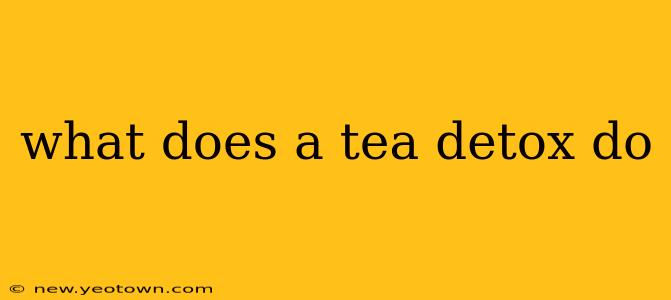What Does a Tea Detox Do? Unraveling the Truth Behind the Hype
The idea of a "tea detox" conjures images of effortless weight loss and radiant skin. But what's the reality behind these alluring promises? Let's dive into the world of detox teas, separating fact from fiction. The truth is, there's no magic bullet, and a tea detox isn't a substitute for a healthy lifestyle. However, certain teas can contribute to overall well-being in specific ways. Let's explore.
My journey into the world of detox teas began with curiosity. I was intrigued by the claims, but also skeptical. I spent weeks researching various types of teas, their purported benefits, and the scientific evidence supporting (or refuting) those claims. What I discovered was a fascinating blend of traditional practices and modern scientific understanding.
What are the purported benefits of a tea detox?
The primary benefit touted by proponents of tea detoxes is weight loss. Many believe that these teas help flush out toxins from the body, leading to a reduction in bloating and overall weight. Others claim improvements in energy levels, skin clarity, and digestive health.
Does a tea detox actually help with weight loss?
This is where things get tricky. While some teas might have mild diuretic or laxative effects, leading to temporary weight loss due to fluid loss, this is not true, sustainable weight loss. Sustainable weight loss requires a combination of a balanced diet and regular exercise. A tea detox alone will not deliver lasting results and could even be detrimental to your health.
What are the different types of detox teas?
There's a vast array of detox teas on the market, each boasting unique ingredients and purported benefits. Some popular choices include:
- Green tea: Known for its antioxidant properties and potential metabolism-boosting effects.
- Ginger tea: Often used to soothe digestive upset and reduce inflammation.
- Rooibos tea: A naturally caffeine-free option, known for its antioxidant and anti-inflammatory properties.
- Dandelion root tea: Traditionally used as a diuretic.
- Lemon and ginger tea: A popular combination said to aid digestion.
It's crucial to remember that the effectiveness of these teas varies, and their purported benefits haven't always been rigorously scientifically proven.
Can detox teas cause side effects?
Yes, some detox teas can cause side effects, especially those containing strong diuretics or laxatives. These can include:
- Dehydration: Due to increased urination.
- Diarrhea: Leading to electrolyte imbalances.
- Stomach upset: Especially in those sensitive to certain ingredients.
- Interactions with medications: Certain teas can interact negatively with prescription or over-the-counter medications.
It is essential to consult with your doctor before starting any detox tea regimen, particularly if you have underlying health conditions or are taking medications.
Are there any natural alternatives to tea detoxes?
Yes! A healthier approach to cleansing your body involves focusing on a balanced diet rich in fruits, vegetables, and whole grains, combined with regular exercise and adequate hydration. These lifestyle choices are far more effective and safer than relying on detox teas for overall well-being.
What about the long-term effects of detox teas?
Long-term use of detox teas can lead to several health problems, including electrolyte imbalances, nutrient deficiencies, and digestive issues. It's crucial to focus on a holistic approach to health and wellness instead of relying on quick-fix solutions.
In conclusion, while some teas offer certain health benefits, the concept of a "tea detox" as a rapid weight-loss or body cleansing method is largely a misconception. Prioritize a balanced lifestyle, including a nutritious diet and regular exercise, for lasting health improvements. Always consult your doctor before making significant dietary changes or using detox products.

